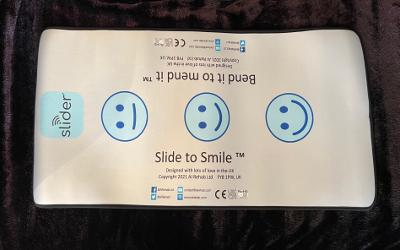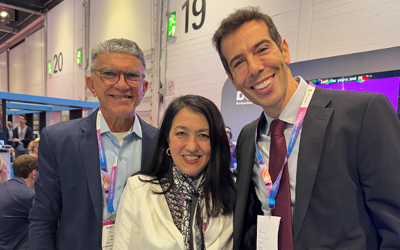OU research supports knee patient surgery

One of the OU’s Open Societal Challenges under the Living Well theme, has led to the development of a new physiotherapy device.
Dr Riasat Islam, Dr Daniel Gooch and Professor Blaine Price in the OU’s Faculty of Science, Technology, Engineering and Mathematics, are lead authors on the paper: A Device for Prehabilitation of Total Knee Replacement Surgery (Slider): Usability Study, published in JMIR Publications, in which he describes the work done with NHS RJAH Trust, Oswestry and AI Rehab Ltd on the Slider product for use with patients preparing for knee replacement surgery.
The research conducted with 17 patients awaiting knee replacement surgery at a UK National Health Service hospital, assessed the practicality and user-friendliness of a newly designed patented physiotherapy device (Slider) that enables exercise monitoring without the need for direct contact with the skin.
“One of the advantages of Slider that it keeps people engaged in their physiotherapy without having to leave home and sends the data in real time to their clinical team (doctor and physiotherapist),” said Dr Islam.
The researchers found that 76% of patients found the device intuitive and easy to use. The majority of patients were satisfied with the device’s ability to meet their presurgery physiotherapy requirements (16/17, 94%) and expressed a willingness to continue using it (17/17, 100%).
Dr Islam added:
“One of the key challenges of rehabilitation technology is ease of use and patients being satisfied with the technology and the overall treatment plan.
“Our initial studies suggest that all these important aspects of technology adoption are fulfilled by Slider. The ease of use is an important driver to adopting such technology and as such we foresee quicker recovery for knee surgery patients and a reduction of costs for care. But of course, these claims require further validation.”
These research findings have helped Slider pass real-world validation assessment, and they can now go for a Randomized Controlled Trial (Clinical Trial).
Slider has also had significant interest from hospitals in the US with plans to begin larger trials and potential adoption of this approach by clinicians.
Shameem Sampath, CEO of AI Rehab, said:
“Slider is the only device for remote physiotherapy that can measure both forces and range of motion. We expect Slider to be a game changer for patients with arthritis of the knee.
“Slider also has the potential to help patients with stroke and age-related muscle weakness (sarcopenia) and children with conditions such as muscular dystrophy and cerebral palsy.”
This work was funded by Lancashire Health Matters (Project ID: 22R18P02712) and is partly funded by the European Regional Development Fund and The Northern Powerhouse (Integrated Research Application System Project ID: 312158).
This work has generated consultancy income for the OU, knowledge exchange, impact, and opened up opportunities for future collaboration with the startup AI Rehab Ltd.
This research forms part of the OU’s Open Societal Challenges Programme, which aims to tackle some of the most important societal challenges of our time through impact-driven research that will transform lives and drive societal change.
You may also be interested in:
- Slider research paper: A Device for Prehabilitation of Total Knee Replacement Surgery (Slider): Usability Study
- OU researchers develop free software set to revolutionise physiotherapy
- More research from the OU’s Faculty of Science Technology Engineering and Mathematics
- Collaborating with the OU on Open Societal Challenges
Contact our news team
For all out of hours enquiries, please telephone +44 (0)7901 515891
Contact detailsNews & articles

OU research model drives literacy transformation across São Paulo
A major state-wide literacy programme in Brazil is demonstrating how Open University research is informing public policy at scale, following its high profile presentation at BETT London 2026 by São Paulo’s Secretary of Education, Renato Feder.